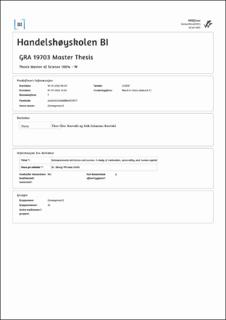Entrepreneurial attributes and success: A study of motivation, personality, and human capital
Abstract
The aim of this study was to research how personal attributes differentiate entrepreneurs with regard to the likelihood of experiencing entrepreneurial success within the Norwegian business landscape. The study is built on a qualitative methodology, alongside a supportive quantitative questionnaire collecting data from a total of 20 entrepreneurs representing a variety of firm sizes and sectors in Norwegian business. The qualitative method was conducted using semi-structured interviews, aimed at gaining comprehensive reflections from the participants. In the supporting quantitative method, we utilized a questionnaire where specific data points (relating to individual personalities, years of education, years of experience, etc.) could be collected more systematically.
We found that entrepreneurial success is directly related to specific personal attributes distinguishing entrepreneurs from other individuals. Our results indicate that entrepreneurial motivation is triggered by personality and may be directly impacted by external forces. Entrepreneurial motivation impacts other personal attributes contributing to entrepreneurial success. The results indicate that specific aspects of individual personality have an impact on entrepreneurial performance leading to success. Namely the personality traits: openness, conscientiousness, extraversion, agreeableness, and neuroticism. The participating entrepreneurs also consider individual personality to be the most determinant factor in terms of achieving entrepreneurial success. Conversely, the results indicate that extreme values related to individual personalities have a negative impact on entrepreneurial performance. Moreover, traits related to human capital (education, experience, knowledge, and networks) enhance an individual's probability of achieving success. The results show that there exists a positive relation between higher education and success. Contrarily, we found that entrepreneurs favor the knowledge gained through experience compared to that of education. The results also show how entrepreneurs deem personality as having a larger impact than human capital with relation to the achievement of success, as obtained human capital also is a result of individual personality. External environmental factors are also found to impact entrepreneurial performance. Still, the results show that the entrepreneurs place a larger emphasis on personal attributes rather than environmental factors when it comes to achieving entrepreneurial success.
Entrepreneurs are encouraged to be highly self-aware regarding their individual personalities, abilities/capabilities, and resources. With higher individual awareness it is easier to seek out necessary types of assistance through networks, partners, or other means which could contribute to fulfilling potential individual shortcomings, ultimately enhancing the likelihood for achieving entrepreneurial success.
ducation and acquired knowledge assist in identifying opportunities and operating an entrepreneurial venture, but personality and increased self-awareness are key catalysts driving entrepreneurial success.
All the findings within our research have been assessed considering their potential implications for both theory and practice, as well as the overlying limitations to our research.
Description
Masteroppgave (MSc) in Master of Science in Entrepreneurship and Innovation - Handelshøyskolen BI, 2022
